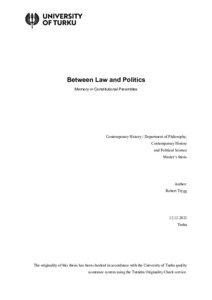Between Law and Politics: Memory in Constitutional Preambles
Trygg, Robert (2023-12-14)
Between Law and Politics: Memory in Constitutional Preambles
Trygg, Robert
(14.12.2023)
Julkaisu on tekijänoikeussäännösten alainen. Teosta voi lukea ja tulostaa henkilökohtaista käyttöä varten. Käyttö kaupallisiin tarkoituksiin on kielletty.
avoin
Julkaisun pysyvä osoite on:
https://urn.fi/URN:NBN:fi-fe20231220156306
https://urn.fi/URN:NBN:fi-fe20231220156306
Tiivistelmä
This thesis explores memory in constitutional preambles and argues that a new form of public and institutional memory – here discussed as constitutional memory – emerges from constitutional law, which acts as an intersection of law and politics. By approaching constitutional preambles as lieux de mémoire akin to monuments and memorials, they are understood as manifestations of political will in that they reimagine entire communities by drawing upon a carefully crafted narrative of the past, as well as a carefully selected catalogue of national memories. As such, they deal with specific memories which can be not only altered but at times suppressed altogether, showing how memory is effectively mobilised as an instrument of politics to emphasise certain things of the past whilst effacing others. By dividing the 134 constitutional texts of this study into four distinct groups using the Democracy Index by the Economist Intelligence Unit, this thesis analyses how memory is invoked in constitutional argument and how it varies between different regime types. This is achieved by coding the qualitative material and classifying it using a loosely defined content analysis method.
Based on a theoretical framework deriving its key concepts from memory studies, this thesis establishes the phenomenon of constitutional memory as a politically sanctioned and politically funded rite of remembering, which is practised by political elites to construct meanings of the past and propagate them more widely or impose them on other members of society through legislation. This is because, despite the limited legal value of constitutional preambles, the prestige of constitutional law is perceived to lend a considerable degree of credibility to its contents, meaning that constitutional preambles can be expected to speak with the same voice of authority as the other sections of the constitutional text. Thus, when constitutional memory makes a claim about the past, such claims operate somewhere between the realms of historical and ideological fiction, which places a particular importance on who and what is remembered and commemorated in constitutional preambles and how such practices of remembrance can have a significant political impact beyond their legal context.
The results of the research reveal that the lower the democratic ranking of the state, the higher the word count of its preamble. In this respect, authoritarian regimes produce by far the longest preambles, which also represent the most advanced attempts to erect a monument to ages past in constitutional argument. They contain the most references to memory, describing not only the essence of the people but also how things came to be; what is perceived to be traditional and what is an innovation; who has committed wrongs and who has been wronged; what we owe to others and what they owe to us, not to mention who is deemed worthy of praise and who of blame. The analysis of the 134 constitutional preambles also reveals that undemocratic regimes claim the most democratic memories as their own, which presents them as stronger proponents of constitutional patriotism on paper than their democratic counterparts. Meanwhile, full and flawed democracies contain fewer such references in their preambles, which further establishes constitutional memory as a significant political resource that is used for identity and legitimation purposes by hybrid and authoritarian regimes in particular.
Based on a theoretical framework deriving its key concepts from memory studies, this thesis establishes the phenomenon of constitutional memory as a politically sanctioned and politically funded rite of remembering, which is practised by political elites to construct meanings of the past and propagate them more widely or impose them on other members of society through legislation. This is because, despite the limited legal value of constitutional preambles, the prestige of constitutional law is perceived to lend a considerable degree of credibility to its contents, meaning that constitutional preambles can be expected to speak with the same voice of authority as the other sections of the constitutional text. Thus, when constitutional memory makes a claim about the past, such claims operate somewhere between the realms of historical and ideological fiction, which places a particular importance on who and what is remembered and commemorated in constitutional preambles and how such practices of remembrance can have a significant political impact beyond their legal context.
The results of the research reveal that the lower the democratic ranking of the state, the higher the word count of its preamble. In this respect, authoritarian regimes produce by far the longest preambles, which also represent the most advanced attempts to erect a monument to ages past in constitutional argument. They contain the most references to memory, describing not only the essence of the people but also how things came to be; what is perceived to be traditional and what is an innovation; who has committed wrongs and who has been wronged; what we owe to others and what they owe to us, not to mention who is deemed worthy of praise and who of blame. The analysis of the 134 constitutional preambles also reveals that undemocratic regimes claim the most democratic memories as their own, which presents them as stronger proponents of constitutional patriotism on paper than their democratic counterparts. Meanwhile, full and flawed democracies contain fewer such references in their preambles, which further establishes constitutional memory as a significant political resource that is used for identity and legitimation purposes by hybrid and authoritarian regimes in particular.
